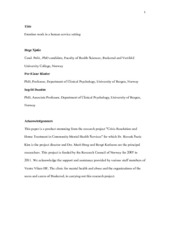| dc.contributor.author | Sjølie, Hege | |
| dc.contributor.author | Binder, Per-Einar | |
| dc.contributor.author | Dundas, Ingrid | |
| dc.date.accessioned | 2016-01-05T14:03:47Z | |
| dc.date.available | 2016-01-05T14:03:47Z | |
| dc.date.issued | 2014 | |
| dc.identifier.issn | 1473-3250 | |
| dc.identifier.issn | 1741-3117 | |
| dc.identifier.uri | https://hdl.handle.net/1956/10879 | |
| dc.description | Published with the title: "Emotion work in a mental health service setting" | eng |
| dc.description.abstract | The purpose of this article is to describe emotion work within a crisis resolution home treatment (CRHT) team. As defined by Hochschild, emotion work refers to the managing of one’s emotions according to what is culturally acceptable within a particular situation. A CRHT team is of particular interest when studying emotion work, since it represents a working environment where mental health crises and suicidal threat are common and where a managing of the accompaning emotions are necessary for the team to function well. Our aim was to expand current knowledge of the particular ways through which emotion work may be done by observing and describing the daily work of such a team. Analysis showed that the team members’ emotion work had the following features: (1) there was an informal rule that “vulnerable” emotions could be expressed, (2) emotional expression was common, (3) emotional expression seemed to reflect the speaker’s need for validation, regulation of emotions, and help in mentalizing and developing a reflexive stance towards her own and the patient’s emotions, (4) emotional support was freely given (5) and this support seemed to fulfil a function that could only be performed by other team members. An implication of these findings is that informal exchanges of emotion are a necessary part of the work and cannot be done outside of the work context. | en_US |
| dc.language.iso | eng | eng |
| dc.publisher | The Authors. | eng |
| dc.relation.ispartof | <a href="http://hdl.handle.net/1956/10876" target="blank">Experiences of Members of a Crisis Resolution Home Treatment Team: Personal history, professional role and emotional support in a CRHT team</a> | |
| dc.subject | Mental health | eng |
| dc.subject | crisis resolution | eng |
| dc.subject | home treatment | eng |
| dc.subject | staff | eng |
| dc.subject | emotion work | eng |
| dc.subject | observation | eng |
| dc.title | Emotion work in a human service setting | eng |
| dc.type | Journal article | |
| dc.description.version | submittedVersion | |
| dc.rights.holder | Copyright the authors. All rights reserved. | eng |
| dc.identifier.doi | https://doi.org/10.1177/1473325015610181 | |
| dc.source.journal | Qualitative Social Work | |
| dc.source.pagenumber | 1-16 | |
| dc.subject.nsi | VDP::Medisinske Fag: 700::Helsefag: 800 | |
| dc.subject.nsi | VDP::Samfunnsvitenskap: 200::Psykologi: 260::Klinisk psykologi: 262 | |
